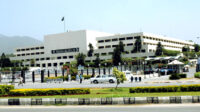July 8, 2021: Pakistan has no right to make allegations of corruption in defense of challenging the jurisdiction of the arbitration tribunal in the Ricoh Deck case, a British judge ruled this week.
In the case of, Balochistan Province vs. Tethyan Copper Company (TCC), High Court of Justice Judge Robin Knowles rejected Balochistan’s position, citing the Supreme Court’s decision to It is not enough that allegations of corruption were raised before the tribunal. According to the ruling, English arbitration law prevents the parties from taking matters to court that were not raised during the arbitration.
The Balochistan government had argued that the International Chamber of Commerce (ICC) tribunal lacked jurisdiction in the Reko diq case as the basic agreement was annulled due to corruption. For years, Balochistan has maintained that a mining company bribed government officials to take unfair advantage of obtaining a mining license in the province.
The British judge found that although the Supreme Court of Pakistan had declared the joint venture null and void, its decision was not based on Pakistan’s allegations that the deal was done through bribery. The judge said that when the court declared the agreement invalid, the apex court did not make any reference to the allegations.
Judge Knowles wrote, “There are insufficient explanations or references to corruption: the question with which the allegation of corruption relates is whether the Supreme Court of Pakistan has found that the agreement and related agreements They were banned because of corruption.”
“In my judgment, this did not happen. If the province has evidence of corruption that did not exist before the ICC tribunal … then it is up to the province to resolve these issues with the arbitration tribunal.” Knowles wrote that he was not justified by the court in challenging the jurisdiction of the arbitral tribunal.
In 2019, the International Centre for Settlement of Investment Disputes (ICSID), too, had rejected Pakistan’s allegation that former Balochistan chief minister Nawab Aslam Raisani was offered a bribe of $1 million by Tethyan Copper Company in connection with Reko Diq mines in 2009.
The current case is part of the mining company’s second arbitration against Pakistan. The first was before ICSID, in which the company won a billion 6 billion award against Pakistan in July 2019.
The TCC is a 50-50 joint venture of Barrick Gold Corporation of Australia and Antofagasta PLC of Chile. The Reko Diq district in the southwest of Balochistan is famed for its mineral wealth, including gold and copper. The ICSID tribunal raised the dispute between Pakistan and the TCC when the latter had claimed billions of dollars when the mining authority in Balochistan rejected an application for a multi-million dollar mining lease in the province.
According to details available on Tethyan website, the Reko Diq Mining project was to produce and operate a world-class copper gold open pit mine at a cost of about $ 3.3 billion. The company says the government is entitled to a mining lease under a 1998 agreement with the Balochistan government, which is only subject to normal government requirements. The project stalled in November 2011 after the application was rejected.
Pakistani officials say the mining lease was terminated by the government because it was secured in a non-transparent manner. By then, the company had invested 220 million in Reko Diq. The company had sought help from the World Bank Arbitration Tribunal in 2012, and in 2017 it ruled against Pakistan, which had overturned the first decision of the Supreme Court.
The tribunal then opted to use a formula for calculating damages for the cancelled lease based on the assumed profits Tethyan might have earned from the mine over 56 years. In July 2019, the tribunal slapped a $5.97bn award against Pakistan for denying the mining lease to the company.
The fine, including the damages award and interest, is equal to about two per cent of Pakistan’s GDP.
Immediately thereafter, the TCC had commenced proceedings for enforcement of the award. In November 2019, Pakistan had challenged the award and initiated proceedings seeking its annulment. In March 2020, the AGP office announced that it had filed a request on Nov 8, 2019, for the annulment of the award rendered by the ICSID. Alongside the plea for annulment, Pakistan had also requested a provisional stay on the enforcement of the award issued against the country.
Pakistan was granted the provisional stay upon initiating annulment proceedings after which a hearing to confirm the stay order took place over video link in April last year. On Sept 16, 2020, the tribunal finally ruled in favour of Pakistan, confirming the stay on the enforcement of the award.
However, on Nov 20, 2020, the company moved a separate case in the BVI High Court for the enforcement of the award, which included attachment of the assets belonging to Pakistan International Airlines Investment Ltd, a final decision on which came out in Pakistan’s favour.
The ICSID is still considering Pakistan’s appeal against the penalty over its decision to cancel the Reko Diq mining lease for the TTC.
Stay tuned to BaaghiTV for latest news and Updates!






